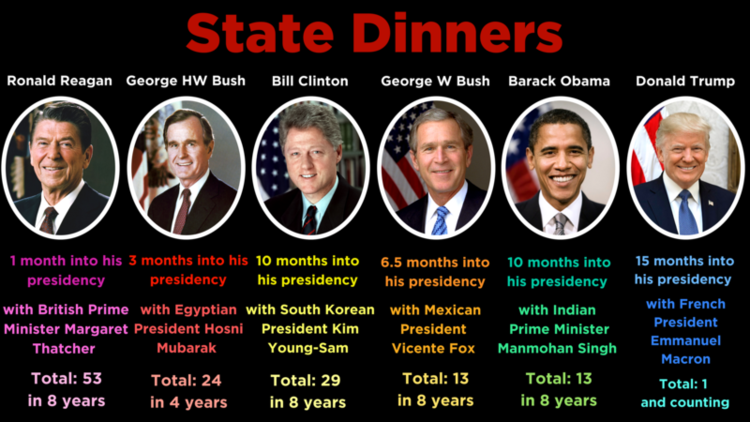5 Facts About Trump's First State Visit

President Trump met with French President Emmanuel Macron this week, marking the first state visit — and the first state dinner — of his presidency.
The visit offers a window into how the president interacts with foreign leaders, at a time when the U.S. and France are addressing major conflicts together, such as those in Iran and Syria. The world will get a second view of Trump as a host Friday, when German Chancellor Angela Merkel makes a visit to Washington.
Here are five things to look for as the president spends his week meeting with allies on U.S. soil.
1. There are policy differences between Trump and Macron. While Trump and Macron have an increasingly strong relationship — some in the media have called it a “bromance” — they appear to disagree on some key issues. The U.S. may pull out of the Iran nuclear deal, while France supports it. The U.S. levied tariffs on aluminum and steel, but France wants waivers for the European Union. The U.S. may pull troops out of Syria; France wants them to stay.
2. Macron will likely continue to push Trump on the Iran nuclear deal. Trump has long been critical of the deal joined by the Obama administration, signaling that the U.S. will pull out by May 12 if it is not changed to address his concerns. Macron favors the deal, and went on Fox News to explain his support in advance of his meetings with Trump.
3. Interactions were closely watched. State visits are full of ceremony and formal events, which are watched and analyzed closely for indicators of how the two world leaders get along. When Macron gave Trump the classic French double kiss on his cheeks, it was noted. When Macron gave Trump an oak sapling as a gift, it was noted. Of course, not every interaction is open to the media. But those that are get scrutinized.

4. The Trumps have their own style of entertaining. The state dinner that took place this week differed from those in the past. Organized by First Lady Melania Trump, the guest list was about 120 people, less than half of state dinners in previous administrations, which could top 300 guests. There were no celebrities or media. And while some events in years past have been bipartisan, Democrats from Congress were reportedly not invited to the state dinner with Macron.
5. Merkel’s visit will be different. Merkel’s trip to the United States is not a state visit, and therefore will not contain all of the ceremony. Rather, it is a working meeting between two major world leaders with much to discuss. Like Macron, Merkel is likely to be interested in the Iran nuclear deal and trade between the U.S. and the European Union.
No Labels is an organization of Democrats, Republicans, and independents working to bring American leaders together to solve problems.




